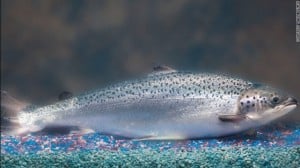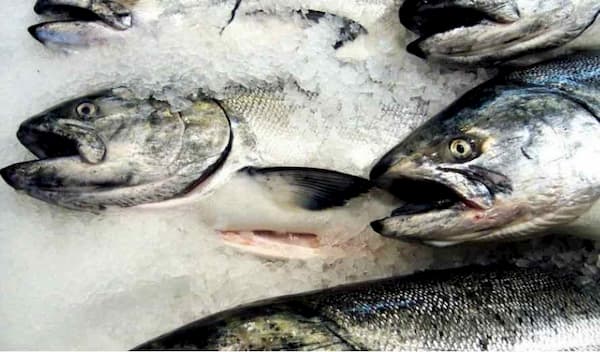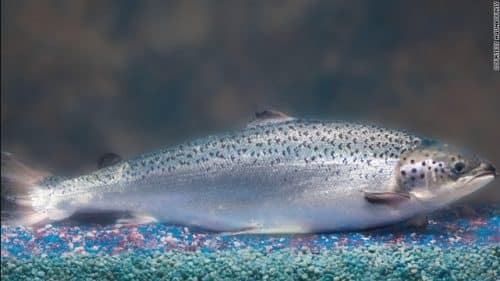
Critics lashed out at the Federal Food and Drug Administration for it decision to approve genetically-modified Atlantic Salmon, deemed “Frankenfish” by some, fit for human consumption on Thursday.
The FDA said on Thursday, that the modified salmon met the safety and effectiveness requirements, and that “FDA scientists rigorously evaluated extensive data submitted by the manufacturer, AquaBounty Technologies, and other peer-reviewed data, to assess whether AquAdvantage salmon met the criteria for approval established by law; namely, safety and effectiveness. The data demonstrated that the inserted genes remained stable over several generations of fish, that food from the GE salmon is safe to eat by humans and animals, that the genetic engineering is safe for the fish, and the salmon meets the sponsor’s claim about faster growth.”
The FDA also said that their approval would have no “significant impact on the environment of the United States,” as the company will have in place containment measures in their land-based facilities in Canada and Panama, making it extremely unlikely that the fish could escape and establish in the wild.
They also pointed out that ” the law does not require food containing ingredients derived from these salmon to be labeled as GE, FDA recognizes that many consumers are interested in this information, and some food manufacturers will want to make the distinction.”[xyz-ihs snippet=”adsense-body-ad”]
The Center for Food Safety Executive Director said in a news release, “The fallout from this decision will have enormous impact on the environment. Center for Food Safety has no choice but to file suit to stop the introduction of this dangerous contaminant.”
“There’s no place on our dinner plates for genetically engineered fish,” Dana Perls, food and technology campaigner at Friends of the Earth-US, said in a statement. “We will continue to work to ensure the market, from grocery retailers to restaurants, continues to listen to majority of consumers that don’t want to eat this poorly studied, unlabeled genetically engineered fish.”
Alaska’s delegates also voiced their opposition to the agency’s decision to approval the controversial salmon.
“I am livid at the FDA’s announcement to approve genetically engineered ‘salmon’—what seems to be more science experiment than fish or food,” said Senator Lisa Murkowski. “I have adamantly opposed the approval of GE salmon, both for the health of Americans and the sustainability of our fisheries, but now that the decision has been made, the next step must be to ensure that Americans know what they are consuming. I have introduced both a bill and provision in the appropriations process to mandate the labeling of Frankenfish, and it is more imperative than ever, after this potentially disastrous decision, to make sure they become law.”
“I am extremely disappointed in today’s decision by the FDA,” said Senator Dan Sullivan. “Genetically Engineered (GE) salmon has no business on our dinner plates. I remain committed to ensuring that at minimum, these newly approved Frankenfish are properly labeled so that Americans know exactly where their salmon came from. Wild Alaskan salmon is an abundant, sustainably managed resource, and despite this misguided decision, will continue to be one of the healthiest and tastiest foods in the world.”
“This harebrained decision goes to show that our federal agencies are incapable of using commonsense,” said Congressman Don Young. “From the beginning, I’ve said the FDA’s process fails to consider the threats GE fish pose to natural salmon fisheries, including genetic contamination, interbreeding, and direct competition. By embarking on this science experiment, the FDA ignores fundamental risk questions related to our wild fish species and food safety. I will continue to push back against this decision that puts all our wild fisheries at risk. At the bare minimum, we must ensure that GE salmon are labeled so consumers know exactly what they are purchasing and feeding to their families.”
Since 1996, AquaBounty Technologies has been developing GE salmon with the hopes of receiving FDA approval to sell it for human consumption. The specific process splices genetic material from the Chinook (King) salmon with that of a pout fish and Atlantic salmon. The resulting organism, the company claims, would grow to the size of an Alaskan King salmon in a shorter period of time than found in nature.[xyz-ihs snippet=”Adversal-468×60″]




